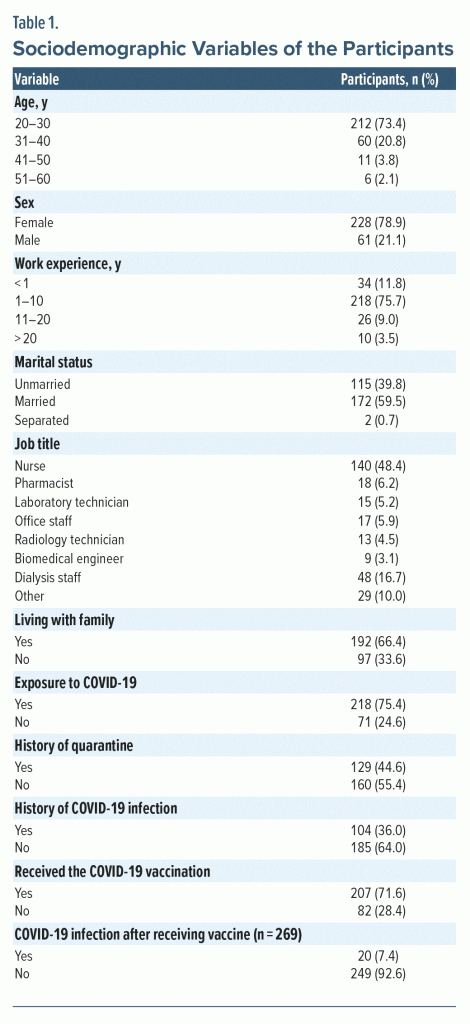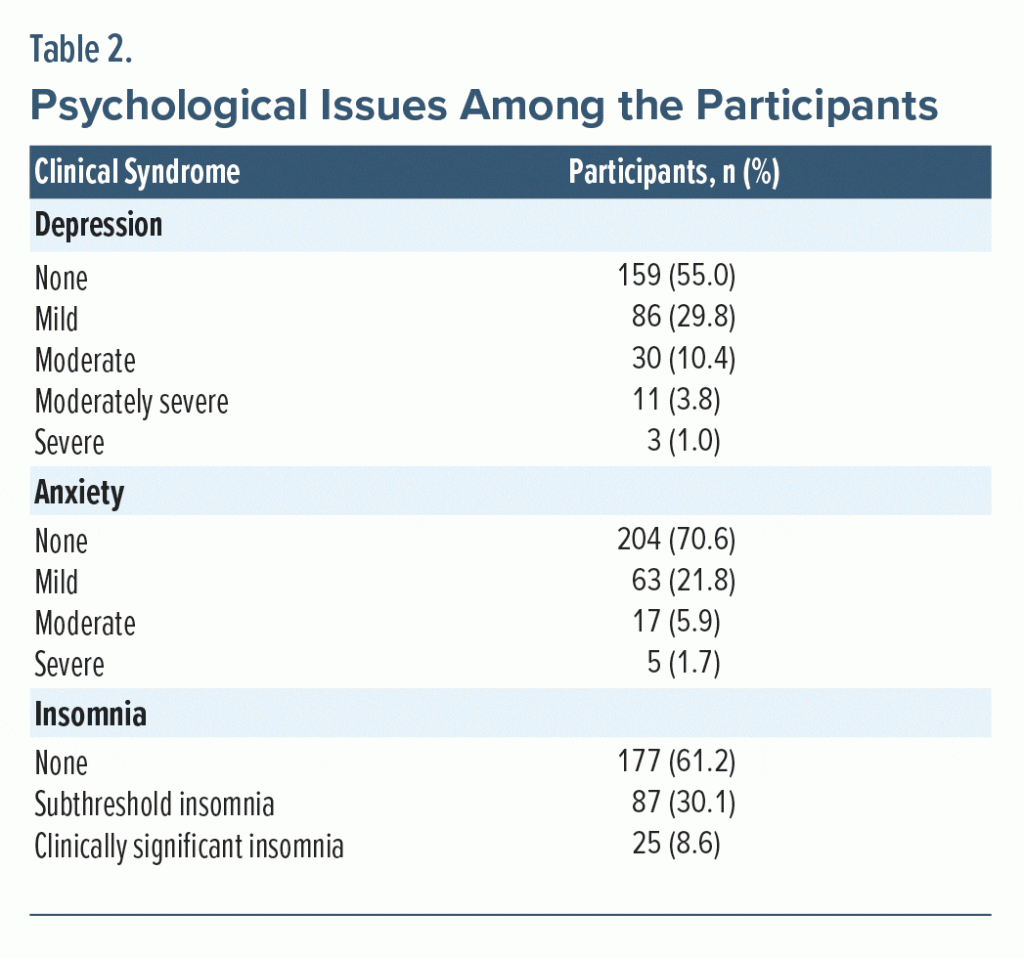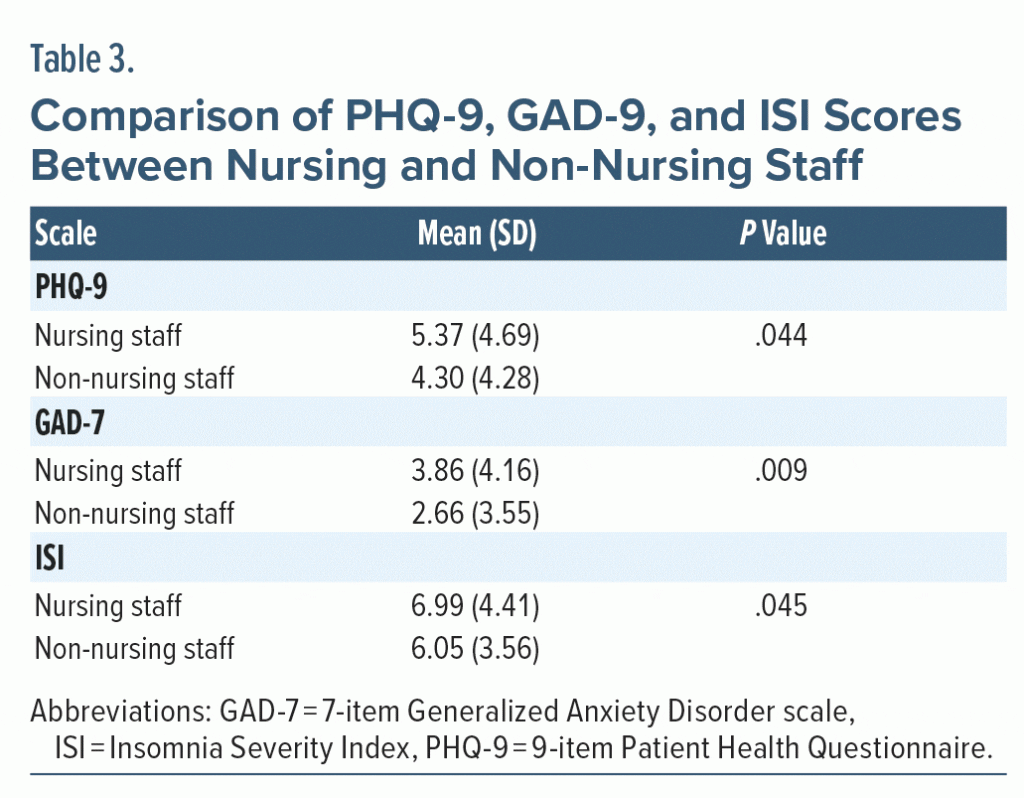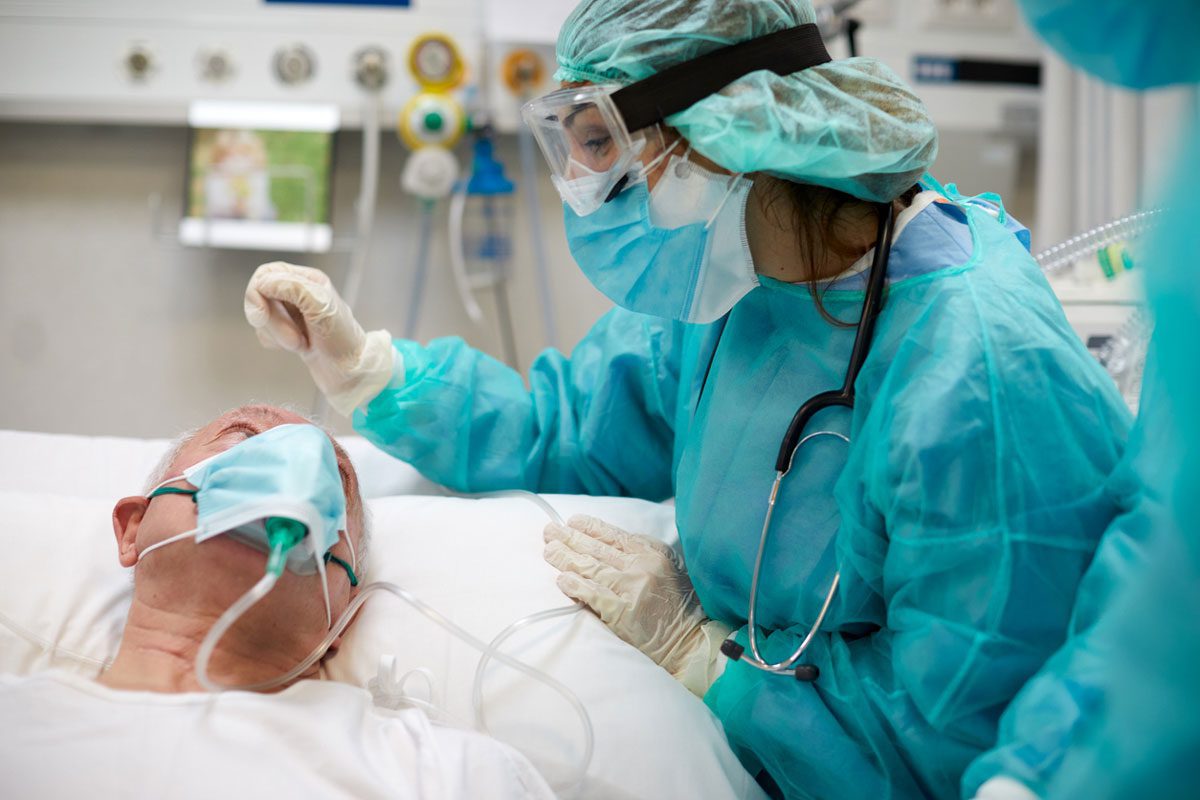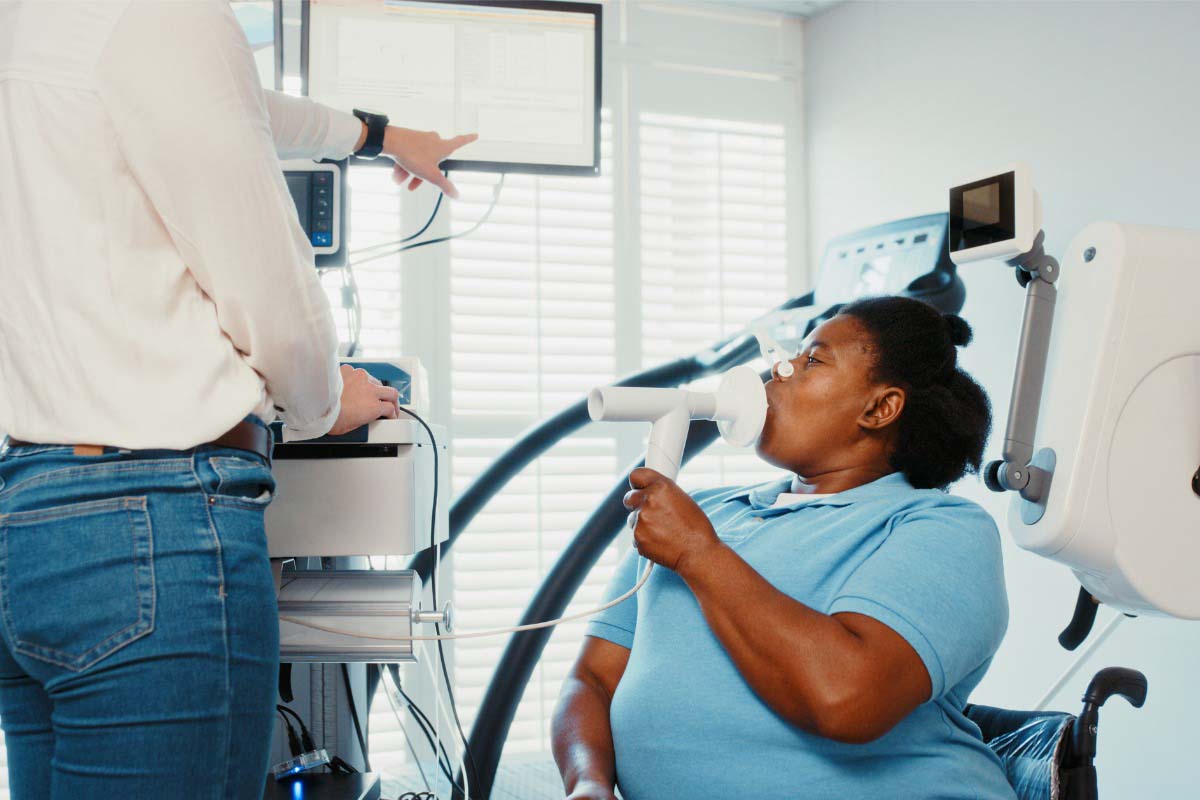ABSTRACT
Objective: To investigate the prevalence of depression, anxiety, and insomnia among hospital staff during the second wave of the COVID-19 pandemic and to explore changes in the rate of psychological morbidities across the first 2 waves.
Methods: This cross-sectional online survey study was conducted between May 15, 2021, and June 29, 2021, among 289 hospital staff (except doctors). Depression, anxiety, and insomnia were measured using the 9-item Patient Health Questionnaire, the 7-item Generalized Anxiety Disorder scale, and the Insomnia Severity Index (ISI), respectively.
Results: Of respondents, 45.0% reported clinically significant depression, 29.4% reported clinically significant anxiety, and 38.7% reported insomnia. Among the nursing staff, 49.6% reported clinically significant depression, 38.1% reported clinically significant anxiety, and 43.9% reported insomnia. There was significantly higher depression (P = .04), anxiety (P = .009), and insomnia (P = .045) among nursing staff compared with other hospital staff. There was a significantly higher prevalence of insomnia among participants living with family (P = .04). There was a significantly higher mean ISI score among participants with a history of COVID-19 exposure (P = .02) and those with a history of COVID-19 infection (P = .04).
Conclusions: This study showed a high prevalence of psychological morbidities among hospital staff. Moreover, psychological morbidities were significantly higher among nurses compared to other hospital staff. Based on these findings, there is an urgent need to design and implement psychological support systems for hospital staff, especially nurses, to maintain their mental health and the quality of clinical services.
Prim Care Companion CNS Disord 2023;25(5):22m03469
Author affiliations are listed at the end of this article.
The mental health of health care workers is a significant public health concern. Studies1,2 have established the prevalence of various psychological morbidities among health care workers to be significantly higher compared to other occupational groups and the general population. The nature of health care services, characterized by excessive workloads, long and undefined work hours, increased responsibility, and recurrent exposure to traumatic events, often predisposes health care workers to significant psychological stress.3 Studies have also reported significantly higher rates of medical errors and lower patient satisfaction when the mental health status of staff is neglected.4
The COVID-19 pandemic exacerbated this existing issue of higher psychological morbidities among health care workers. Working in health care settings was found to be an important risk factor for having psychological morbidities during the COVID-19 pandemic compared to the general population.5 Also, a recent meta-analysis6 exploring psychological morbidities during the COVID-19 pandemic found that the prevalence of depression, anxiety, and insomnia was significantly higher among health care workers compared to the general population. The unprecedented increase in patient volume, long work hours wearing personal protection equipment, higher risk of COVID-19 infection to self and family, death of colleagues due to COVID-19 infection, frequent exposure to death of patients, and the ethical dilemma associated with rationing of life-saving treatments were some of the important factors influencing the mental health of health care workers during the pandemic.3
The second wave of COVID-19 severely impacted India, resulting in an exponential increase in cases, reduced supplies of essential treatments such as oxygen, and increased deaths, particularly in the young population.7 However, the mental health impact of the devastating second wave of COVID-19 on the Indian population was unclear. A recent prospective study8 exploring the prevalence of anxiety and depression among 2 large aging cohorts in rural and urban parts of India during the first and second waves of the COVID-19 pandemic found similar rates of depression (28.8% vs 28.8%) and lower rates of anxiety (5.5% vs 3.9%) among the rural sample and higher levels of depression (6.5% vs 13.1%) and lower levels of anxiety (1.7% vs 0.66%) among the urban sample. However, another similar study9 from India among health care workers found significant improvements in the level of depression, anxiety, and stress among participants during the second wave (versus the first wave). Our previous study10 among hospital staff during the first phase of the COVID-19 pandemic revealed that more than 1 in 10 hospital staff suffered from mental health conditions (depression: 16.4%, anxiety: 13.8%, and insomnia: 13.3%). We conducted the current study in India during the second wave of the COVID-19 pandemic to understand the changes in the prevalence of psychological morbidities among hospital staff across the first 2 waves of the COVID-19 pandemic.
METHODS
This cross-sectional online survey study was conducted between May 15, 2021, and June 29, 2021, in a tertiary care hospital and research center in Calicut, Kerala, India. A snowball sampling technique was used to recruit participants. The online self-report questionnaire was designed using Google Forms. The link to the questionnaire was sent through WhatsApp and other social media platforms to hospital staff known to the investigators, and the participants were encouraged to forward the survey to other staff members working in the hospital. The study was approved by the hospital ethics committee, and participation in the survey was voluntary.
The survey comprised questions pertaining to demographic and personal characteristics such as age, sex, number of work years, job title, marital status, and living with family, followed by a list of COVID-19 pandemic–related questions such as history of exposure to COVID-19, history of quarantine, history of COVID-19 infection, COVID-19 vaccination status, and history of COVID-19 breakthrough infection after receiving the vaccine. Three questionnaires were also included in the survey: the 9-item Patient Health Questionnaire (PHQ-9),11 7-item Generalized Anxiety Disorder scale (GAD-7),12 and Insomnia Severity Index (ISI)13 to assess clinically significant depression, anxiety, and insomnia, respectively.
The PHQ-9 is a commonly used instrument to screen for clinically significant depression that has 88% sensitivity and specificity to detect major depressive disorder.11 This screening instrument contains 9 questions, and a 4-point rating scale from 0 (not at all) to 3 (every day) is used to respond to each question. The total score ranges between 0 and 27. The levels of depression can be diagnosed based on the total score as follows: mild (5–9), moderate (10–14), moderately severe (15–19), and severe (20–27).
The clinically significant anxiety symptoms were screened with the GAD-7.12 This instrument consists of 7 questions assessing various anxiety symptoms over the last 2 weeks, and a 4-point rating scale from 0 (not at all) to 3 (every day) is used to answer each question. The total score of the GAD-7 ranges between 0 and 21, and the level of anxiety is diagnosed based on the total score as follows: mild (5–9), moderate (10–14), and severe (15–21).
The severity of insomnia was assessed using the ISI. The ISI consists of 7 questions assessing the nature, severity, and impact of insomnia.13 Each item is rated on a 5-point Likert scale (0–4 scale), and the total score ranges from 0 to 28. The level of insomnia can be diagnosed based on the total score as follows: absence of insomnia (0–7), subthreshold insomnia (8–14), moderate insomnia (15–21), and severe insomnia (22–28).
The data were analyzed using SPSS version 22.0. Descriptive statistics were used to calculate percentages, mean, and standard deviation. The association between sociodemographic and COVID-19–related characteristics and psychological morbidities was assessed using the χ2 test. An independent sample 2-tailed t test was used to compare continuous variables.
RESULTS
We received complete responses from 289 hospital staff. Most of the study participants were aged 18 to 30 years (73.4%), and 78.9% were female, 75.7% had work experience between 1 and 10 years, and 59.5% were married. Also, 48.4% were nurses. The other professional groups included dialysis technicians (8.7%), dialysis nurses (8%), pharmacists (6.2%), laboratory technicians (5.2%), radiology technicians (4.5%), office employees (5.9%), and biomedical engineers (3.1%).
The results revealed that 66.4% were staying with their families during the study period, 75.4% had a history of COVID-19 exposure, 44.6% had a history of quarantine after COVID-19 exposure, and 36.0% had a history of COVID-19 infection. Also, 71.6% of the respondents received at least 1 dose of COVID-19 vaccination, and 7.4% had COVID-19 infection even after receiving the vaccine. The sociodemographic details are summarized in Table 1.
Of the participants, 130 (45.0%) reported clinically significant depression according to PHQ-9 scores: 86 (29.8%) reported mild depression, 30 (10.4%) reported moderate depression, 11 (3.8%) reported moderately severe depression, and 3 (1%) reported severe depression. Eighty-five (29.4%) study participants reported clinically significant anxiety: 63 (21.8%) reported mild anxiety, 17 (5.9%) reported moderate anxiety, and 5 (1.7%) reported severe anxiety. Subthreshold insomnia was reported by 87 (30.1%) study participants, and 25 (8.6%) reported clinically significant insomnia. The psychological morbidities of the respondents are summarized in Table 2.
Among the nursing staff, 49.6% reported clinically significant depression, 38.1% reported clinically significant anxiety, and 43.9% reported insomnia. Among non-nursing staff, 41.3% reported clinically significant depression, 21.7% reported clinically significant anxiety, and 33.6% reported insomnia.
There was a significantly higher prevalence of depression (χ2 = 13.07, df = 4, P = .01) and anxiety (χ2 = 9.31, df = 3, P = .03) among nursing staff compared with other hospital staff (Table 3). The mean PHQ-9 (5.37 vs 4.30, P = .04), GAD-7 (3.86 vs 2.66, P = .009), and ISI (6.99 vs 6.05, P = .045) scores were significantly higher among nursing staff compared with other hospital staff in 2-tailed t tests. There was a significant positive correlation between depression, anxiety, and insomnia scores.
There was a significantly higher prevalence of insomnia among participants living with family (χ2 = 9.13, df = 4, P = .04). There was a significantly higher mean ISI score among participants with a history of COVID-19 exposure (6.82 vs 5.55, P = .02) and among those with a history of COVID-19 infection (7.16 vs 6.14, P = .04).
DISCUSSION
The current study explored the prevalence of depression, anxiety, and insomnia and their correlates among hospital staff during the second wave of the COVID-19 pandemic in South India. The study found that the prevalence rates of depression, anxiety, and insomnia among the hospital staff were 45.0%, 29.4%, and 38.7%, respectively. These prevalence rates are high compared to a similar study10 conducted among the same hospital staff during the early period of the COVID-19 pandemic. The previous study conducted in May 2020 found that the prevalence rates of depression, anxiety, and insomnia among hospital staff were only 16.4%, 13.8%, and 13.3%, respectively.10 Studies conducted among hospital staff during the COVID-19 second wave from various parts of the world also reported a high prevalence of clinically significant psychiatric symptoms. A study14 conducted among hospital staff in Xinjiang, China, using the PHQ-9, GAD-7, and ISI during the COVID-19 second wave, reported that the prevalence rates of depression, anxiety, and insomnia were 60.2%, 49.6%, and 41.1%, respectively. Similar to our findings, another study15 from India using the 21-item Depression, Anxiety, and Stress Scale (DASS-21) reported that the prevalence of depression and anxiety among health care workers at a tertiary care public hospital during the second wave of COVID-19 was 44.3% and 43.9%, respectively. However, a study16 from Vietnam among frontline health care workers during the second wave of COVID-19 using the DASS-21 reported that only 18% and 11.5% of the study population had clinically significant depression and anxiety, respectively. The varying rates of psychological morbidities among hospital staff may be due to different contextual factors in various countries. The higher psychological morbidity in India among hospital staff during the second wave indicates the psychological impact of the rapidly spreading delta strain among a significant section of the Indian population that stretched the health systems of the country to its limits, along with significant shortages in critical resources and manpower.15 On the other hand, the relatively lower prevalence of psychological morbidities in Vietnam indicates the positive mental health effects of effective public health interventions in the handling of the second wave of COVID-19 among hospital staff in that country.17 Finally, our study population included non–frontline hospital staff in the context of COVID-19 management. The higher prevalence in this population indicates the impact of the COVID-19 second wave on the mental state of staff working in hospital environments irrespective of direct management of COVID-19 patients. However, a previous study18 regarding the impact of the second wave of the COVID-19 pandemic on non–frontline health care workers reported prevalence rates of depression and anxiety of 14.33% and 15.82%, respectively. One reason for this discrepancy could be that the hospital where our study was conducted is the busiest hospital in the city, and a significant proportion of the population in the district came to this hospital for treatment. Hence, the risk of exposure to COVID-19 in such a busy hospital setting was high, as the result showed that 75.4% of the hospital staff had a history of COVID-19 exposure and 36.0% already had a history of COVID-19 infection at the time of the study.
We also found a significantly higher prevalence of depression (49.6%), anxiety (38.1%), and insomnia (43.9%) among nursing staff compared to other hospital staff, which is consistent with previous studies. The nursing role has been found to be an independent risk factor associated with increased mental health symptoms in hospital staff in previous studies.19,20 The prevalence of depression and insomnia in this study was higher compared to other studies among health care workers during the COVID-19 pandemic. A recent Indian multicenter study21 among nurses deployed in high-risk units during the COVID-19 pandemic found that the prevalence of depression and anxiety among nurses posted in COVID-19 wards was 21.64% and 32.98%, respectively. Another systematic review regarding psychological morbidities among health care workers found that the pooled prevalence rates of depression, anxiety, and insomnia were 36%, 37%, and 32%, respectively.22
The prevalence of psychological morbidities among nurses in this study was high compared to our previous study10 conducted in the same hospital during the early phase of the COVID-19 pandemic. The comparison of the prevalence of depression (20.9% vs 49.6%), anxiety (15.9% vs 38.1%), and insomnia (17% vs 43.9%) among nurses during the 2 phases of COVID-19 showed the serious impact of the second wave on the mental health of nurses working in tertiary care hospital settings where the risk of infection was high.10 However, other published studies also reported contradictory findings. A recent Indian study9 reported significant improvement in depression (42.2% vs 9.6%) and anxiety (41.3% vs 16.3%) among hospital staff during the second wave of COVID-19 infection (versus the first wave). Another Italian study23 among nurses directly involved in the care of COVID-19 patients in both the first and second waves of the pandemic showed mixed results. There was a statistically higher prevalence of depression and a statistically lower prevalence of insomnia among nurses during the second wave of COVID-19 infection (versus the first wave). There was no significant difference in anxiety levels.23 The authors attributed these changes in the presence of psychological morbidities among hospital staff to greater awareness of the illness, better coping skills, better family and social support, better support from the hospital authorities, availability of the standard infection control and treatment protocol, and vaccination.22,24
There are limitations to our study that must be considered. The major limitation is that the present study utilized an online survey methodology to collect data, which is known to produce selection bias. Another limitation is that the study was limited to a single tertiary care hospital.
In conclusion, this study revealed a high rate of anxiety (29.4%), depression (45%), and insomnia (38.7%) among hospital staff. Moreover, psychological morbidities were significantly higher among nurses compared to other hospital staff. Based on these findings, there is an urgent need to design and implement psychological support systems for hospital staff, especially nurses, to maintain their mental health and the quality of clinical services.
Article Information
Published Online: September 19, 2023. https://doi.org/10.4088/PCC.22m03469
© 2023 Physicians Postgraduate Press, Inc.
Submitted: December 16, 2022; accepted April 4, 2023.
To Cite: Uvais NA, Nalakath MJ. Prevalence of psychological morbidities among hospital staff during the second wave of COVID-19 in India. Prim Care Companion CNS Disord. 2023;25(5):22m03469.
Author Affiliations: Department of Psychiatry, Iqraa International Hospital and Research Centre, Calicut, Kerala, India (Uvais); Department of Hospital Administration. Iqraa International Hospital and Research Centre, Calicut, Kerala, India (Nalakath).
Corresponding Author: N. A. Uvais, MBBS, DPM, Iqraa International Hospital and Research Centre, Calicut, Kerala, India ([email protected]).
Relevant Financial Relationships: None.
Funding/Support: None.
Clinical Points
- Psychological morbidities during the second wave of the COVID-19 pandemic were significantly higher among nurses compared to other hospital staff.
- Clinically significant sleep problems were significantly higher among participants with a history of COVID-19 exposure and those with a history of infection.
- Effective measures should be planned and implemented in advance to support hospital staff during pandemics.
References (24)

- Gerada C. Doctors, suicide and mental illness. BJPsych Bull. 2018;42(4):165–168. PubMed
- Saade S, Parent-Lamarche A, Bazarbachi Z, et al. Depressive symptoms in helping professions: a systematic review of prevalence rates and work-related risk factors. Int Arch Occup Environ Health. 2022;95(1):67–116. PubMed CrossRef
- Søvold LE, Naslund JA, Kousoulis AA, et al. Prioritizing the mental health and well-being of healthcare workers: an urgent global public health priority. Front Public Health. 2021;9:679397. PubMed CrossRef
- Perego G, Cugnata F, Brombin C, et al. The “healthcare workers’ wellbeing [benessere operatori]” project: a longitudinal evaluation of psychological responses of italian healthcare workers during the COVID-19 pandemic. J Clin Med. 2022;11(9):2317. PubMed CrossRef
- De Kock JH, Latham HA, Leslie SJ, et al. A rapid review of the impact of COVID-19 on the mental health of healthcare workers: implications for supporting psychological well-being. BMC Public Health. 2021;21(1):104. PubMed CrossRef
- Krishnamoorthy Y, Nagarajan R, Saya GK, et al. Prevalence of psychological morbidities among general population, healthcare workers and COVID-19 patients amidst the COVID-19 pandemic: a systematic review and meta-analysis. Psychiatry Res. 2020;293:113382. PubMed CrossRef
- Asrani P, Eapen MS, Hassan MI, et al. Implications of the second wave of COVID-19 in India. Lancet Respir Med. 2021;9(9):e93–e94. PubMed CrossRef
- Sundarakumar JS, Menesgere AL, Hameed SKS, et al; SANSCOG & TLSA Study Teams. Depression and anxiety during the first and second waves of the COVID-19 pandemic in two large, prospective, aging cohorts in rural and urban India. Health Sci Rep. 2022;5(6):e901. PubMed CrossRef
- Gupta S, Basera D, Purwar S, et al. Comparing the psychological problems among the health care workers across two waves of SARS-CoV-2 (COVID-19) pandemic: an observational study from India. Disaster Med Public Health Prep. 2022;17:e224. PubMed CrossRef
- Uvais NA, Nalakath MJ, Jose K. Facing COVID-19: psychological impacts on hospital staff in a tertiary care private hospital in India. Prim Care Companion CNS Disord. 2021;23(2):20m02843. PubMed CrossRef
- Kroenke K, Spitzer RL, Williams JB. The PHQ-9: validity of a brief depression severity measure. J Gen Intern Med. 2001;16(9):606–613. PubMed CrossRef
- Spitzer RL, Kroenke K, Williams JB, et al. A brief measure for assessing generalized anxiety disorder: the GAD-7. Arch Intern Med. 2006;166(10):1092–1097. PubMed CrossRef
- Morin CM, Belleville G, Bélanger L, et al. The Insomnia Severity Index: psychometric indicators to detect insomnia cases and evaluate treatment response. Sleep (Basel). 2011;34(5):601–608. PubMed CrossRef
- Zhao Y, Guo J, Liu S, et al. Prevalence and related factors of depression, anxiety, acute stress, and insomnia symptoms among medical staffs experiencing the second wave of COVID-19 pandemic in Xinjiang, China. Front Public Health. 2021;9:671400. PubMed CrossRef
- Khan F, Dewalwar V, Roy P, et al. The silent toll of second COVID-19 wave: a dass-21 questionnaire survey among health-care workers at a tertiary-care public hospital, Mumbai. Ann Indian Psychiatry. 2022;6:155–163. CrossRef
- Le Thi Ngoc A, Dang Van C, Nguyen Thanh P, et al. Depression, anxiety, and stress among frontline health workers during the second wave of COVID-19 in southern Vietnam: a cross-sectional survey. PLOS Glob Public Health. 2022;2(9):e0000823. PubMed CrossRef
- Minh LHN, Khoi Quan N, Le TN, et al. COVID-19 timeline of vietnam: important milestones through four waves of the pandemic and lesson learned. Front Public Health. 2021;9:709067. PubMed CrossRef
- Thakar S, Singh S, Dalton AE, et al. Psychological impact of the second wave of the COVID-19 pandemic on non-frontline healthcare workers: results of a cross-sectional study in a tertiary care hospital in India. Int J Community Med Public Health. 2021;8(6):2829–2838. CrossRef
- Smallwood N, Karimi L, Bismark M, et al. High levels of psychosocial distress among Australian frontline healthcare workers during the COVID-19 pandemic: a cross-sectional survey. Gen Psychiatr. 2021;34(5):e100577. PubMed CrossRef
- Smallwood N, Harrex W, Rees M, et al. COVID-19 infection and the broader impacts of the pandemic on healthcare workers. Respirology. 2022;27(6):411–426. PubMed CrossRef
- Ahmad A, Chakraborty R, Goyal S, et al. Psychological effects of COVID 19 pandemic on nurses deployed in high risk units: a multicentre observational study. J Mar Med Soc. 2022;24(suppl S1):18–24.
- Sun P, Wang M, Song T, et al. The psychological impact of COVID-19 pandemic on health care workers: a systematic review and meta-analysis. Front Psychol. 2021;12:626547. PubMed CrossRef
- Vitale E. Anxiety, depression, and insomnia conditions in Italian nurses during the first and the second waves of the COVID-19 pandemic. J Evid Based Psychother. 2021;21(1):69–82. CrossRef
- Busch IM, Moretti F, Mazzi M, et al. What we have learned from two decades of epidemics and pandemics: a systematic review and meta-analysis of the psychological burden of frontline healthcare workers. Psychother Psychosom. 2021;90(3):178–190. PubMed CrossRef
Enjoy this premium PDF as part of your membership benefits!
